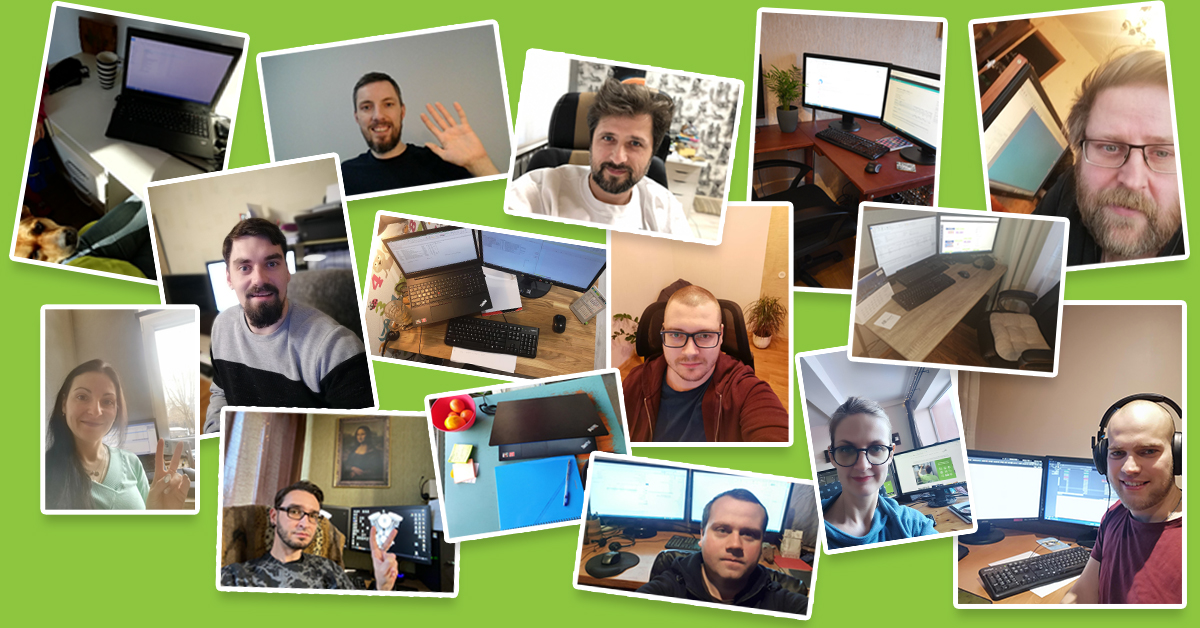AE Partner’s teams experience working remotely
We are a manufacturing company, and more than two-thirds of our employees continue to work on site. They are our superheroes and our foundation and keep working daily, adapting to the precautions and restrictions.
However, these employees are not our whole team. Administration, Logistics, IT and Project departments usually spend their daily work in the office, mostly working on a computer.
Currently, part of our employees, whose work duties can be performed from a home-based office, go to their office in slippers. We have surveyed remotely working employees and share their experience.
The reasons why employees have moved their desks from company premises to homes are different. Twenty-four employees took part in the survey. Their working time remotely varies. For some, it is only a few days of self-isolation. For others, it is more than two months.
Most employees choose to work remotely to protect themselves, relatives, and colleagues from accidental infection and, of course, not having to do work in masks.
The most significant benefit of working from home is the increased ability to concentrate in a well-appointed workplace in a quiet room in your home.
Here are some quotes from surveyed colleagues:
- A little more time for yourself, because no time is spent driving to and from work. Working from home makes it possible to be close to loved ones and pets if they need to be looked after for some reason. Also, the idea of a Friday afternoon when you are waiting to go home disappears because I am aware that the holidays will start with getting up from the chair.
- I can listen to music out loud. No need to spend your time going to and from work. You don’t have to look for a private room to talk to suppliers by phone, because that’s a problem in the open space office.
- I can feel free – coughing, sniffing, etc. Even if I have a real runny nose, I don’t have to stop working and go through an epic of sick leaves and GPs. No need to put on a mask. You can breathefreelyand the glasses do not get foggy.
Employees also point to various risks when working remotely:
- Lack of team sense, do not see what colleagues are working on, less frequent communication with colleagues and of course more challenging to get info from production – sometimes it is convenient to go to see and look at everything and take pictures of what the customer wants, it isn’t easy to coordinate it remotely.
- Lack of lively work environment, delicious coffee, and ready lunch. And, of course, direct contact with colleagues, team members. I like to separate my spaces – work is work, home is home, but it isn’t easy to separate when you work from home, especially that someone behind the door calls, “Mom! How long do you have to work!”, ” Mom, I want to eat.” etc. But compared to spring, when I worked from home for the first time, this time it is psychologically easier and calmer.
- Definitely isolation. Being isolated, it is possible to escape the rare unpleasant or awkward moments, but with them, the daily conversations and the usual contact with colleagues also disappear. Working for a long time alone, the team’s feeling and motivation begins to fade. In everyday life, this feeling and motivation of the team is ensured by contact with the allies, and to replace it, it would be necessary to organize more motivational events. Unfortunately, this is not possible due to an emergency.
We conclude from a long-known truth – each coin has two sides, working from home does as well. We, people, are social beings and work successfully in a team, but work is not negatively affected. Instead, the impact of working remotely on the work to be performed is individual. Most employees indicated that they would like to be in the office on average 2-3 days a week, and there were very few who expressed a wish to work only in the office or only remotely.

